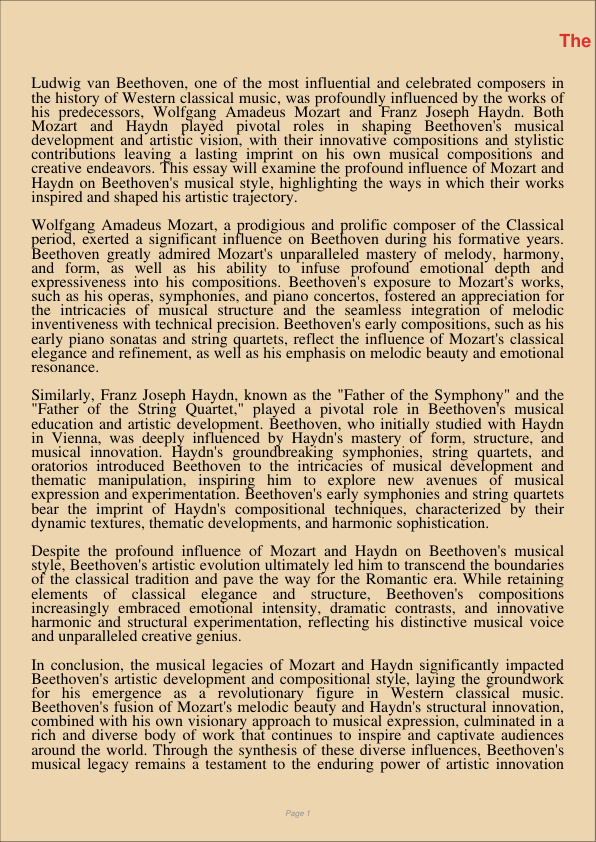The Influence On Beethoven Of The Famous Composers Mozart And Hayden
Dec 31, 2023
famous composers mozart
influence
Family & Consumer Science
Business

Ludwig van Beethoven, one of the most influential and celebrated composers in the history of Western classical music, was profoundly influenced by the works of his predecessors, Wolfgang Amadeus Mozart and Franz Joseph Haydn. Both Mozart and Haydn played pivotal roles in shaping Beethoven’s musical development and artistic vision, with their innovative compositions and stylistic contributions leaving a lasting imprint on his own musical compositions and creative endeavors. This essay will examine the profound influence of Mozart and Haydn on Beethoven’s musical style, highlighting the ways in which their works inspired and shaped his artistic trajectory.
Wolfgang Amadeus Mozart, a prodigious and prolific composer of the Classical period, exerted a significant influence on Beethoven during his formative years. Beethoven greatly admired Mozart’s unparalleled mastery of melody, harmony, and form, as well as his ability to infuse profound emotional depth and expressiveness into his compositions. Beethoven’s exposure to Mozart’s works, such as his operas, symphonies, and piano concertos, fostered an appreciation for the intricacies of musical structure and the seamless integration of melodic inventiveness with technical precision. Beethoven’s early compositions, such as his early piano sonatas and string quartets, reflect the influence of Mozart’s classical elegance and refinement, as well as his emphasis on melodic beauty and emotional resonance.
Similarly, Franz Joseph Haydn, known as the “Father of the Symphony” and the “Father of the String Quartet,” played a pivotal role in Beethoven’s musical education and artistic development. Beethoven, who initially studied with Haydn in Vienna, was deeply influenced by Haydn’s mastery of form, structure, and musical innovation. Haydn’s groundbreaking symphonies, string quartets, and oratorios introduced Beethoven to the intricacies of musical development and thematic manipulation, inspiring him to explore new avenues of musical expression and experimentation. Beethoven’s early symphonies and string quartets bear the imprint of Haydn’s compositional techniques, characterized by their dynamic textures, thematic developments, and harmonic sophistication.
Despite the profound influence of Mozart and Haydn on Beethoven’s musical style, Beethoven’s artistic evolution ultimately led him to transcend the boundaries of the classical tradition and pave the way for the Romantic era. While retaining elements of classical elegance and structure, Beethoven’s compositions increasingly embraced emotional intensity, dramatic contrasts, and innovative harmonic and structural experimentation, reflecting his distinctive musical voice and unparalleled creative genius.
In conclusion, the musical legacies of Mozart and Haydn significantly impacted Beethoven’s artistic development and compositional style, laying the groundwork for his emergence as a revolutionary figure in Western classical music. Beethoven’s fusion of Mozart’s melodic beauty and Haydn’s structural innovation, combined with his own visionary approach to musical expression, culminated in a rich and diverse body of work that continues to inspire and captivate audiences around the world. Through the synthesis of these diverse influences, Beethoven’s musical legacy remains a testament to the enduring power of artistic innovation and creative synthesis across the realms of classical music.